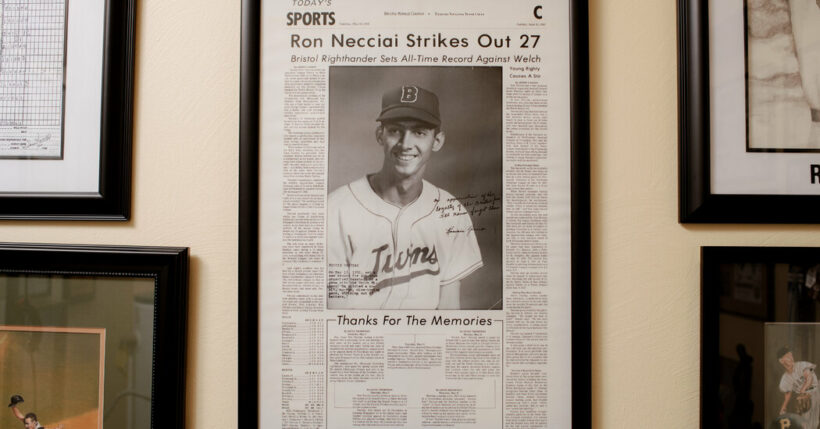by Jonathan Abrams
Supported by
Send any friend a story
As a subscriber, you have 10 gift articles to give each month. Anyone can read what you share.
By Jonathan Abrams
BELLE VERNON, Pa. — Seventy years ago, Ron Necciai accomplished a feat that no other professional pitcher — not Walter Johnson, not Bob Gibson, not Nolan Ryan, not anyone — ever managed: He struck out 27 hitters in a nine-inning game. The major league record for strikeouts in a nine-inning game, achieved four times, is 20.
It was May 1952, and Necciai, 19, had no clue what he had achieved in his no-hitter until his manager informed him and his catcher, Harry Dunlop, after the game.
“I’ve heard all kinds of things,” said Necciai, who did it while pitching for the Bristol Twins, a low-level minor league affiliate of the Pittsburgh Pirates in Virginia. “I’ve heard the fans in the stands were chanting, 25, 26. I don’t remember that. I don’t pay attention to the fans. There’s a guy down there between me and Dunlop with a bat.”
A reporter from The Bristol Herald Courier, the lone journalist to witness the game, hurried to write an article that The Associated Press carried nationally. “The Ed Sullivan Show” asked Necciai to appear, he said, but he and the Pirates declined. A few days later, Bristol held a Ron Necciai night to celebrate him. As far as most people were concerned, that was pretty much the end of his moment of fame.
And yet that extraordinary pitching performance defined his life forever — not just for Necciai, but for obsessed fans who see miracles in box scores.
As a child, I was one of them. Not long ago, I had the opportunity — for the second time — to ask Necciai about that night.
‘Buy a Gas Station’
Necciai carried the recognition from the 27-strikeout game for the rest of his career, which turned out not to be long. He finished the 1952 season with a horrid Pirates squad, going 1-6 in 12 games.
That off-season, he was drafted into the Korean War, then discharged with chronic bleeding ulcers. He hurt his shoulder preparing for the baseball season, and a doctor told him: “Son, go home and buy a gas station. You’re never going to pitch again.”
“That’s life,” Necciai told me. “Hell, after a while you get over it.”
He became a manufacturer’s rep, selling hunting and fishing equipment. He and Martha, his wife of 67 years, raised three children.
The embers of his fame occasionally glowed. A couple of times when Necciai was traveling, he said, agents recognized his name and quickly stamped him through customs or put him on a flight.
But mostly there are the letters. They come from Germany, from the United States, from everywhere. Someone in Japan sends a 1,000-yen note every few months.
Some letters came from my hometown. From me.
I spent a lot of my childhood writing letters to athletes and asking for their autographs. In 1995, when I was 11, I wrote one to Necciai, whose feat I had read about in a long-defunct magazine named Collector’s Sportslook, and asked him questions about pitching.
He responded in elegant cursive, graciously answering the same questions he has received for generations. We exchanged letters. He told me about a busy work trip, advised me to listen to my mother and to stay in school.
I understand now that I was cultivating and pairing what became lifelong interests in sports and writing. But lately I’ve wondered what it was like for this man, now old, to still be recognized for something he did on a single day when he was young.
‘Baseball Doesn’t Last Forever’
I called him, and in May he invited me to his neat home overlooking the plush green of the Mon Valley in Pennsylvania.
“They call this God’s waiting room,” he said with a chuckle upon greeting me.
Necciai is 90 with shoulders still broad. He has not lost much height since his 6-foot-5 playing days. He busies himself in retirement with crossword puzzles, and he and Martha can spot hummingbirds out one window and see their basil growing out the other.
He occasionally grabbed my arm to steady himself as he showed me memorabilia — a scrapbook containing his first signed contract, the telegram summoning him to the big leagues, plaques commemorating the 1952 game.
“It’s getting a little harder and harder to walk,” Necciai said. “I have degenerative joint disease. When you’re old, you’ve got to get something.”
At his dining room table, Necciai clasped copies of the letters he had sent me, just as he palmed the baseball so many years ago.
Baseball doesn’t last forever for players, so you must work just as hard on your education, he had written to me. Education lasts forever.
He hadn’t gotten a college education himself, and regretted it. But he didn’t have a lot of other regrets. Necciai’s life was full by any measure. He had a long marriage, a family, a home, those hummingbirds.
And he had his name in the record books. I asked him what it meant to him.
“If you look back, just about everything,” he said. “I’m surprised at the people that still remember. I haven’t played in 70 years. I still get fan mail every week. A real big impression. It’s meant a lot.”
It was approaching midafternoon, time to say our goodbyes. The mail would be arriving soon, perhaps carrying a letter from a faraway stranger who would make him famous for one more day.
Summer Fame
Source: Read Full Article

